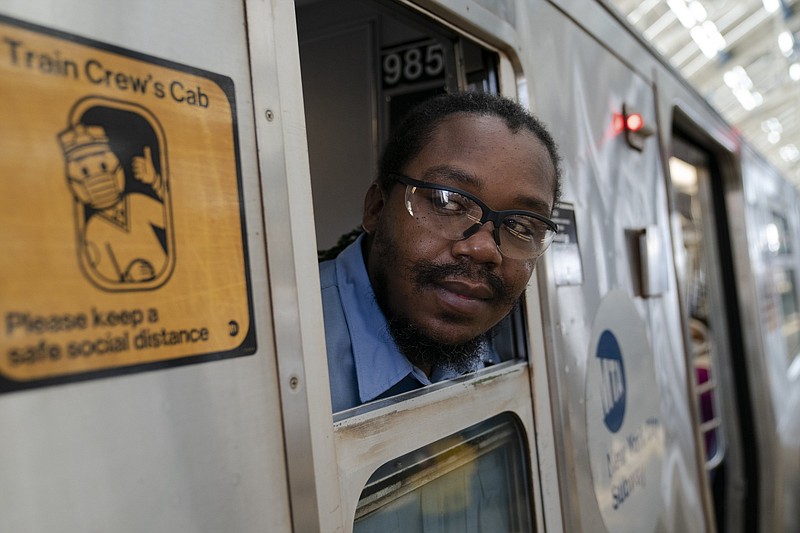NEW YORK -- The early months of the coronavirus pandemic shined a spotlight on essential workers.
As cities shut down, thank you signs went up on windows, and applause rang out each evening for the workers still out there. At the time, there was hope the pandemic would be short-lived.
Instead, the virus spread, evolved and unleashed new challenges.
More than 60% of U.S. workers had jobs that couldn't be done from home during the pandemic, according to a Pew Research Center survey. Front-line workers struggled with inconsistent masking policies, fought for hazard pay and campaigned for lasting changes, including a $15 minimum wage and adequate paid sick leave.
The arrival of vaccines has brought new trials. Labor advocates fought for paid time off and other policies to help give workers access to the vaccines, while confronting reluctance among many to get the shots.
At this latest crossroads, The Associated Press caught up with four of the workers it profiled last year: a nurse's assistant, a subway driver, a cleaner and a warehouse worker.
THE CLEANER
Annette Brown's boss called her into the office one day a few months ago. He read emails the medical staff had written, praising Brown's dedication to her job as an overnight worker cleaning rooms at a hospital in Halethorpe, Md.
The recognition was hard-won. In the early days of the pandemic, Brown wandered around the hospital in search of leftover N-95 masks because the nurses had priority amid a nationwide shortage.
By her count, 11 co-workers at her hospital quit during the pandemic. A single mother of two, Brown couldn't consider doing the same.
This month, she was promoted to supervisor, earning her a $2 hourly raise that bumped her pay to $17.90 an hour.
"They started showing a bit more respect to the housekeeping staff because they saw us in action and how important our job is," she said.
Last year, Brown told the AP what she wanted most was a vaccine. She got her shot in February but her fears still linger, especially for her children who are going to school in person this fall.
THE SUBWAY DRIVER
Transit workers in New York City became eligible for the vaccine in January, but Desmond Hill did not get his shot until April.
The subway conductor worried "because of how fast the vaccine was created as well as the politics that went into it." His grandmother and father begged him to get it.
He finally rolled up his sleeve at a station where the Metropolitan Transportation Authority, New York's mass transit agency, was hosting a vaccination drive.
"The change of heart came from realizing what kind of job I have and what it requires of me as far as being in contact with thousands of people a day," Hill said.
According to the transit authority, at least 171 of its workers have died from covid-19 since the start of the pandemic, the majority of them people of color.
Hill says getting the vaccine has made a "night-and-day" difference.
He celebrated with a trip to Las Vegas, and best of all, resumed weekly visits with his grandmother.
"She's sitting right beside me," Hill said with a laugh. "We had lunch and went on a shopping run."
THE WAREHOUSE WORKER
The pandemic pulled Courtenay Brown into activism.
It started in March 2020 when she saw social media posts from fellow Amazon warehouse workers demanding more protection from the virus. Brown, who works at an Amazon Fresh warehouse in Newark, N.J., jumped in after someone dismissively wrote that Amazon workers should just be grateful for their jobs.
Soon, she was recruited by the United For Respect labor advocacy group, and found herself talking to journalists and lawmakers.
It was thrilling for Brown, an exuberant storyteller whose childhood included bouts of homelessness. During a news conference last fall, she made headlines when she threw out the phrase "turkey apocalypse" to describe fears that the holiday season would lead to a surge in infections.
But the slow pace of progress was disheartening. Amazon, for instance, never reinstated the hazard pay that was the key demand of the "turkey apocalypse" news conference.
"It's one thing to be on the outside of the fight and suffering. It's another thing to be in the fight. You get your hopes up," Brown said. "Having no hope isn't as bad as having hope and repeatedly having it crushed."
Brown, a Navy veteran, got vaccinated as soon as possible at a VA hospital and tried to talk hesitant co-workers into getting the shots. Amazon has held more than 1,100 on-site vaccination clinics. It has also offered bonuses and even a lottery for a car and a $500,000 cash prize to encourage its workers to get vaccinated but so far has stopped short of requiring the shots.
THE HEALTH-CARE WORKER
Linda Silva hasn't regained her sense of smell more than a year after contracting covid-19 while working as a nurse's assistant at two hospitals in New York. But she's grateful to be alive.
A doctor reminded her, "A lot of people lost their lives, all you lost is your smell,'" she said.
A study by Kaiser Health News and the Guardian found that more than 3,600 U.S. health care workers died of covid-19 during the first year of the pandemic, two-thirds of them people of color. That study also found that nurses and support staffers such as Silva were more likely to die than physicians.
Silva got vaccinated as soon as she could in January.
By May, the rest of her family was vaccinated and celebrated with a trip to Kissimmee, Fla.
"It was our first time going out and doing something -- it felt great to be able to get out there," she said. "I want to let people know it is very important to take the vaccine. We can get back to more normalcy."
Information for this article was contributed by Angeliki Kastanis of The Associated Press.
